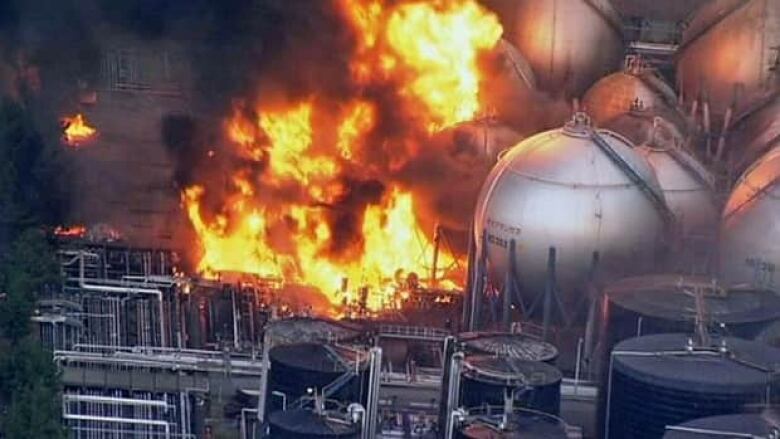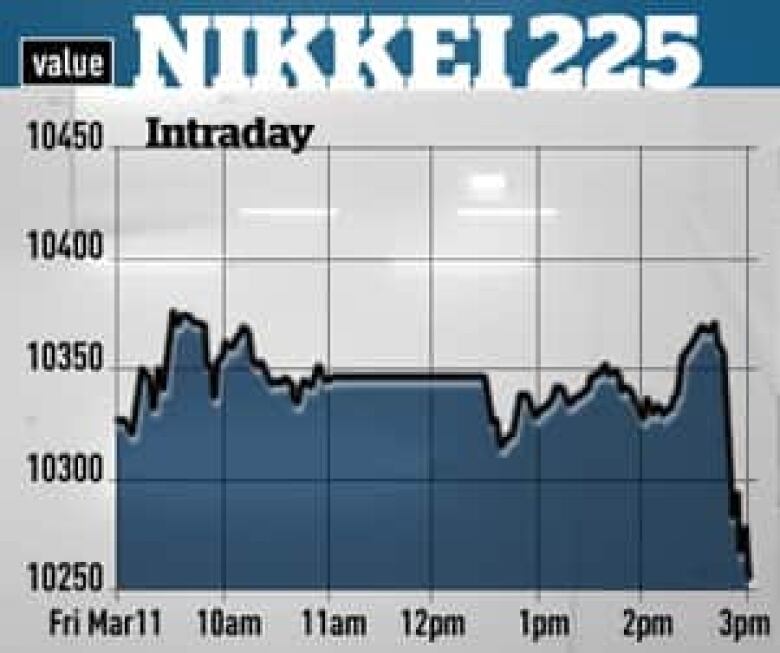Japan quake causes financial turmoil
One estimate puts reconstruction cost at $60B US

The massive earthquake off the Japanese coast sent oil prices sharply lower Friday and caused worry over how the debt-laden country will pay for its own reconstruction.
Japan's benchmark stock index, theNikkei, closed down 1.7 per cent, to 10,254.43,its lowest point inmore than five weeks. Much of the losses came in the 14 minutes immediately following the magnitude 8.9 quake, which struck at 2:46 p.m. local time.The market closed at 3 p.m.
The country's central bank moved quickly to trytosoothe financial jitters.
"The bank will continue to assess possible impact of the earthquake on financial markets as well as on financial institutions' business operations, and stand ready to take action as necessary," the Bank of Japan said in a statement.

"The bank will continue to do its utmost, including the provision of liquidity, to ensure the stability in financial markets and to secure the smooth settlement of funds, in the coming week."
One Japanese specialist suggested, as a ballpark estimate, that reconstruction could cost $60 billion US.
"I would estimate reconstruction costs lower than the Kobe earthquake, which was $100 billion," Pradyumna P. Karan, a professor at the University of Kentucky, told CBC News in an email.
Karan, the author of Japan in the 21st Century: Environment, Economy, and Society, said the area accounts for only eight per cent of Japan's gross domestic product.
The devastated northeastern coastal region is far less developed than the Tokyo metro area.
"Something similar hitting Tokyo Bay would have been unimaginable," said Michael Smitka, an economistat Washington and Lee University in Virginiawho specializes in Japan.
The yen soared 1.3 per cent to trade at 81.87 to the U.S. dollar late Friday afternoon as traders recognized that insurance companies and investors will have to sell foreign currency assets and buy back yen to pay for reconstruction.
The Japanese central bank will likely draw upon 200 billion yen (roughly $2.4 billion Cdn) in emergency funding set aside in the budget for the current fiscal year.
But beyond that, the bank has little room to manoeuvre in terms of stimulating the economy, as its benchmark lending rate is already effectively at zero.
Worst timing
Indeed, from an economic perspective, the quake could not have hit Japan at a worse time. Last month, Moody's Investors Service cut its outlook on Japan's debt rating, questioning the government's power to enact reforms even as it struggled with the highest debt burden among advanced economies.
The country is struggling to deal with a national debt that's more than twice as large as the country's GDP. Japan's famously thrifty population is the major buyer of Japanese debt, but the Japanese havebeen showing signs of being tapped out in recent months.
"It's going to cost a lot of money and I don't want to belittle that," said Paul Summerville, a senior fellow at the Centre for Global Studies at the University of Victoria, "but the reality is, the real bad impact is psychological this is a country in a 20-year economic slowdown, and has recently been passed by China."
"This is just the latest bad thing to happen," he said.
While there will certainly be pain, Summerville noted that at least the billions will be spent on infrastructure projects, which have a much greater impact than borrowing to spend money on consumption.
Marcus Noland, director of the Peterson Institute for International Economics agrees with the notion that infrastructure spending will help the economy in the long term.
"Japan needed a Keynesian stimulus," he told CBC News. "Now they have an unimpeachable reason. This will force an improvement in the quality of public [investments]. They have to rebuild Sendai."
At the same time, the impact on other countries can't be dismissed,Summerville says.
"When something like this happens in Japan, it's going to impact the global supply chain."
That's happening already, as Japanese automakers halted production at assembly plants in areas hit by the earthquake.
One Honda worker was crushed by a collapsing wall and died. More than 30 other people were injured when walls and parts of a ceiling crumbled at a Honda Motor Co. research facility in northeastern Tochigi prefecture, the company said.
Japan and Canada
Japan is a key trading partner for Canada, the third-largest market in the world for Canadian exports. More than $11.1 billion worth of Canadian-made goods went to Japan in 2008, official data shows.
Some $15.3 billion worth of Japanese goods came the other way the same year. Two-way trade in services between the two countries is also significant, totalling $3.8 billion in 2008.
The earthquake struckbarely two weeks after Canadian Trade Minister Peter Van Loan announced the government was taking the first step toward negotiating a free-trade deal with Japan.
Van Loan told CBC News then thatthe two countries had agreed to launch a joint study on the feasibility of establishing an economic partnership.
After the Kobe quake in 1995, Canadas exports to Japan jumped 24 per cent, BMO chief economist Sherrie Cooper noted Friday, compared with a 16 per centgain for exports to all countries.
Production at two Honda plants was halted but resumed shortly afterward at one, it said.
Toyota Motor Corp., the world's biggest automaker, shut down two auto assembly plants, in the Iwate and Miyagi prefectures. There were no immediate reports of injuries among its workers, spokeswoman Monika Saito said. Parts-makers were also shut down, she said.
Nissan Motor Co. halted production at five of its plants in northeastern Japan and in the Yokohama area near Tokyo. It said two workers were slightly injured at its Tochigi plant and its technical centre in Kanagawa prefecture, near Tokyo.
Losses were posted all around Asia and in Europe. The FTSE 100 index of leading British shares was down 0.3 per cent, at 5,828.67, while France's CAC-40 fell 0.9 per cent, to 3,928.68. Germany's DAX was 1.2 per cent lower, at 6,981.49.
The Toronto stock market closed higher, withthe S&P/TSX composite index gaining 35.67 points, to 13,674.25.
TSX-listed Manulife Financial Corp was 1.1 per cent lower to $17.35. Rival Sun Life Financial Inc. was down 0.8 to $30.30. Neither of the companies is in the property or casualty business, but they may have exposure to the Nikkei, the benchmark Japanese market index.
Insurers across the globe were heavily sold off as worries about exposure to the devastated region mounted.
Insurers usually takeearly hit
NYSE-listedAflac Inc. shares were down more than two per cent. The company earned more than three-quarters of its 2010 revenue from its Japanese operations.Berkshire Hathaway Inc. was alsoone per cent lower. Warren Buffett's firm is heavily sensitive to losses from natural disaster insurance.
"It's pretty early days to establish any early figures, but clearly when these events take place, the initial response is to knock the insurers," said Jeremy Batstone-Carr, director of private client research at Charles Stanley stockbrokers in London.
European insurers fared even worse, with Swiss Re and Munich Re both trading nearlysix per cent lower.
Oil prices were sharply lower, as demand is likely to be decimated in the world's third-largest economy and the third-largest oil importer in the world.About 20 per cent of Japan's refining capacity has been knocked offline, along with 11 nuclear power stations. Nuclear energy makes up 40 per cent of Japan's electrical needs.
Japans daily oil consumption in 2009 was 4.4 million barrels. Almost all of it has to be covered by imports.
"I think the view is the Japanese economy will take at least a temporary step back because of this and oil prices have dropped," said Doug Porter, deputy chief economist at BMO Capital Markets.
April oil in New York closed down $1.54 US, at $101.16 a barrel, while Brent crude in London was down 1.9 per cent, to $113.33.
With files from The Associated Press












_(720p).jpg)


 OFFICIAL HD MUSIC VIDEO.jpg)
.jpg)



























































































